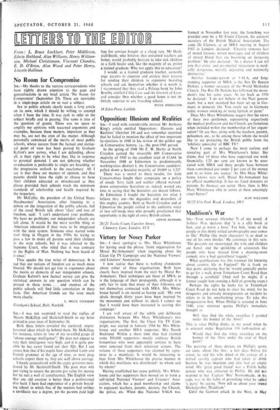No Room for Compromise
iNE
D.
1TM
From : L. Bruce Lockhart, Peter Middleton, Edwin Hubbard, Alan Williams, Henry William- son, Michael Christiansen, Viscount Chandos, E. D. O'Brien, Alan Wood and Peter Henry. Lincoln Hainan.
Sia,—My thanks to the various correspondents who have rightly drawn attention to the gaps and generalisations in my brief article 'No Room for Compromise' (September 23). These are inevitable in a single-page article on so vast a subject.
Sex in public schools clearly needs a long article on its own, which I should be willing to attempt when I have the time. It was rash to refer to the subject briefly and in passing. The same is true of the question of grants. There was no space to amplify my opinions with reasoned arguments and examples, because these matters, important as they may be, are not the crux, of the matter. Although personally convinced of the merits of most public schools, whose success from the factual and statisti- cal point of view has been proved by Graham Kalton's new survey, what I am defending, above all, is their right to be what they like in response to parental demand. I am not debating whether- co-education is preferable to single sex boarding, or the progressive outlook to the reactionary. All I say is that these are matters of opinion, and that parents should have the right to choose to have their children educated or . miseducated as they please provided their schools reach the minimum standards of scholarship and health required by the inspectors.
Mr McCallie, the president of the United States Headmasters' Association, after listening to a debate on the integration of the public schools, full of the usual British talk about 'class and loss of freedom, said: 'I can't understand your problems. We have no problems; our independent schools are left alone. It would be the most terrible thing in American education if they were to be integrated with the state system. Someone once started some fool thing in Oregon in the 1920s by trying to pass a law to make all parents send their children to the state schools, but it was referred to the Supreme Court, who ruled that it was contrary to the Rights of Man. Nothing has been heard of it since.'
Thus speaks the true voice of democracy. It is sad that our notions of freedom are so much more blurred. We should not get lost in arguments about the merits or demerits of our independent schools. Graham Kalton's new factual survey can give the statistical answers to any question which can be proved in these terms . . . and enemies of the public schools will find little consolation in these facts. Our American friends see the issue much more clearly.
L. BRUCE LOCKHART
Gresham's School, Holt, Norfolk


































 Previous page
Previous page